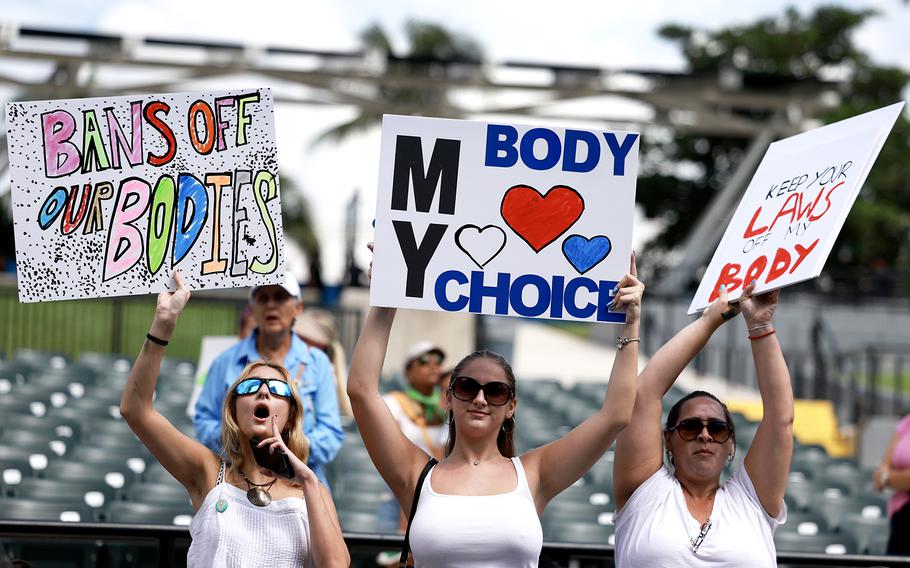
People attend the Our Bodies Our Lives: A Rally for Reproductive Freedom at the Bayfront Amphitheater on Sept. 14, 2024, in Miami, Florida. The rally was held to advocate for the passage of Amendment 4, which will be on the state of Florida’s November ballot, giving women a constitutional right to abortion in the state. (Joe Raedle/Getty Images/TNS)
(Tribune News Service) —
Limiting governmental intrusion sounds great. Right?
Protecting the health of mothers. Who would object to that?
That’s how advocates behind Florida’s Amendment 4 ballot initiative, which seeks to constitutionalize a right to abortion in Florida, are framing the issue in hopes of reaching the required 60% threshold for the amendment to pass.
But they can only hope that voters don’t see past their messaging, because if Floridians dig deeper, they won’t like what they find. Why? Because Amendment 4 would transform Florida into having one of the most extreme pro-abortion regimes in the country.
To understand why, let’s start from the beginning.
After the U.S. Supreme Court overturned Roe v. Wade, which even liberal scholars and Justices like Ruth Bader Ginsburg agreed was fatally flawed, the responsibility to regulate abortion returned to the states.
Floridians, like many other citizens around the country, enacted legislation designed to protect the lives of unborn children while making sure that expectant mothers could still receive appropriate medical care.
After lengthy legal challenges, the Florida Supreme Court upheld this new law.
Not content, abortion advocates decided to try to override the law by adding a broad right to abortion to Florida’s constitution. To do so, they’ve taken advantage of Florida’s ballot initiative process and have put on the November ballot a relatively benign-sounding initiative, entitled an “Amendment to Limit Government Interference with Abortion.”
The vague and ambiguous language might allow it to sneak past voters. Here’s the summary that will appear on the November ballot: “No law shall prohibit, penalize, delay, or restrict abortion before viability or when necessary to protect the patient’s health, as determined by the patient’s healthcare provider. This amendment does not change the Legislature’s constitutional authority to require notification to a parent or guardian before a minor has an abortion.”
But this ambiguous language hides several important questions.
For starters, when is viability? The amendment doesn’t define it, and it’s defined nowhere else in the Florida Constitution. Even abortion advocates are split over including — and leaving undefined — this flexible term in abortion ballot measures around the country.
When is it necessary to protect the patient’s health? And what conditions qualify? As other have correctly pointed out, the amendment’s language gives broad leeway to health care providers to advocate for an abortion even after the point of viability — whenever that might be — up until mere moments before birth. And even more troublingly, the “patient’s health” can be defined so broadly as to include even temporary, non-life-threatening conditions.
And finally, who qualifies as a health care provider? Most people probably assume an OB/GYN or another medical doctor are functioning in this capacity as a health care provider — or maybe a physician’s assistant or nurse practitioner.
But under the ambiguous language of the amendment, non-medical professionals such as “school counselors, personal trainers, massage therapists, and acupuncturists” could all qualify as health care providers able to determine whether an abortion is “necessary to protect a patient’s health.” All these professions currently qualify in some form or fashion as health care providers under Florida law.
Then, of course, there’s the issue of parental notification. Current Florida law provides that before a minor can terminate her pregnancy, she must receive the consent of a parent or guardian. The law also provides for a judicial bypass option where a court can authorize an abortion absent parental consent, especially in instances involving sexual abuse by the parent or guardian.
The new amendment would likely call these protections of minors into question since it explicitly references only the Legislature’s authority to require notification. But it remains eerily silent on the question of consent.
Florida Supreme Court Justice Renatha Francis, dissenting from the court’s decision to allow the amendment on the ballot with its vague and confusing ballot summary, said that “the summary hides the ball as to the chief purpose of the proposed amendment: which, ultimately, is to — for the first time in Florida history — grant an almost unrestricted right to abortion.”
Justice Meredith Sasso, joined by two of her colleagues, worried that because the amendment’s language has no “readily discernible meaning,” if it becomes law, courts will have “to determine even its most essential legal effects over time.”
With power over abortion policy finally returned to the people, shouldn’t Floridians expect more? Even if you advocate for abortion — though I don’t — shouldn’t you want it to be clear what policies you’re pursuing? Apparently not.
If Floridians want to debate abortion access and policies, it should be done openly and fairly with plain language that clearly states what the law will be. That’s the minimum that should be expected from our democratic process. And Amendment 4 falls far short.
Zack Smith is a senior legal fellow in The Heritage Foundation’s Meese Center for Legal and Judicial Studies. Heritage is listed for identification purposes only. The views expressed in this article are the authors’ own and do not reflect any institutional position for Heritage or its Board of Trustees.
©2024 Tribune Content Agency, LLC.